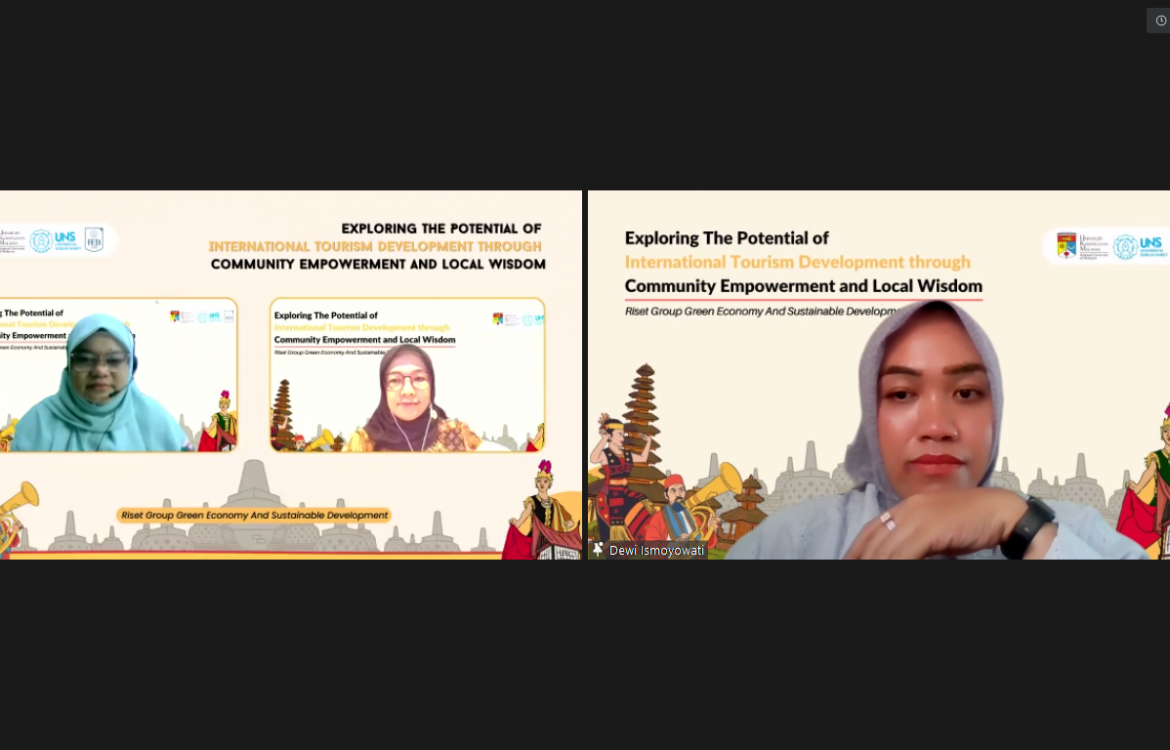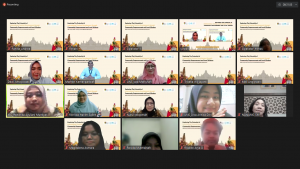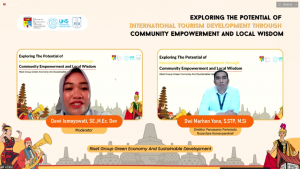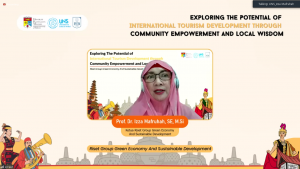
Green Economy and Sustainable Development Research Group FEB Presents Three Speakers at an International Webinar
Commitment to tourism development, especially the leaders’ commitment, is crucial. In terms of community empowerment in the tourism industry, there are numerous applicable methods for tourism business actors. This information was revealed by Dwi Marhen Yono, S.STP, M.Si., Director of Tourism Marketing of the Ministry of Tourism Indonesia, at the International Webinar ‘Exploring the Potential of International Tourism Development Through Community Empowerment and Local Wisdom,’ on Thursday, May 25, 2023.
 The international webinar was organized by the Green Economy and Sustainable Development Research Group, Faculty of Economics and Business (FEB), Universitas Sebelas Maret (UNS). Three guest speakers were invited, namely Dwi Marhen Yono, S.STP, M.Si., (Director of Tourism Marketing Kemenparekraf RI), Associate Prof. Dr. Norlida Hanim Mohd Salleh (Universiti Kebangsaan Malaysia), and Dr. Nurul Istiqomah, S.E., M.Si (DESP FEB Universitas Sebelas Maret).
The international webinar was organized by the Green Economy and Sustainable Development Research Group, Faculty of Economics and Business (FEB), Universitas Sebelas Maret (UNS). Three guest speakers were invited, namely Dwi Marhen Yono, S.STP, M.Si., (Director of Tourism Marketing Kemenparekraf RI), Associate Prof. Dr. Norlida Hanim Mohd Salleh (Universiti Kebangsaan Malaysia), and Dr. Nurul Istiqomah, S.E., M.Si (DESP FEB Universitas Sebelas Maret).
In addition to delivering material related to the recovery of the tourism sector and Indonesia’s tourism development plan, Dwi Marhen also explained the halal certification process that has been initiated by the government. The initiative was revealed during the question and answer session with webinar participants.
The second speaker for the session, Assoc. Prof. Dr. Norlida Hanim, delivered material entitled ‘Rural Tourism: How Could Local Communities Develop Their Local Wisdom as Economic Values?’
Responding to the material that has been submitted by Marhen, Prof. Norlida agreed that today cultural tourism has become public demand. Further, she explained the aspects needed to develop rural tourism and the challenges faced. “This development (of the tourism sector) requires the role of the government. It is also necessary to consider local wisdom, environmental support, planning, and other planning from the internal sector within the community,” explained Prof. Norlida, in line with Marhen’s statement.
The material presentation continues to the third speaker, Dr. Nurul Istiqomah, with material entitled ‘Sustainable Tourism Development.’ Dr. Nurul also represents the Green Economy and Sustainable Development Research Group in this webinar.
In her presentation, Dr. Nurul focuses on the implementation of sustainable tourism after the Covid-19 pandemic. It was revealed that Indonesian tourism is growing rapidly after the pandemic. The growth is proven by the increase in Indonesia’s Global Tourism Index in 2021.
“The difference between sustainable tourism and conventional tourism lies in the involvement of stakeholders. In conventional tourism, development and enhancement activities only involves tourism sector actors, such as managers or tourism site caretaker. While on sustainable tourism, all stakeholders in the tourism region are involved in the tourism management process, including tourists who visit tourist sites,” explained Dr. Nurul.
 The lecturer of the DESP FEB UNS then explained that although the Indonesian tourism index improved, the attention toward sustainable tourism has not improved. “To reduce the negative impact of the tourism sector, including natural damage, we know of the carrying capacity concept. As mentioned by the previous speaker, the concept refers to a specific calculation to limit the number of visitors. Therefore, minimizing the negative effects. This concept is applied, for example, in the Raja Ampat tourism area, which is indeed designed in such a way, to limit the number of visitors and to reduce environmental damage,” she said.
The lecturer of the DESP FEB UNS then explained that although the Indonesian tourism index improved, the attention toward sustainable tourism has not improved. “To reduce the negative impact of the tourism sector, including natural damage, we know of the carrying capacity concept. As mentioned by the previous speaker, the concept refers to a specific calculation to limit the number of visitors. Therefore, minimizing the negative effects. This concept is applied, for example, in the Raja Ampat tourism area, which is indeed designed in such a way, to limit the number of visitors and to reduce environmental damage,” she said.
Concluding the event, Prof. Izza Mafruhah, Chairman of the Green Economy and Sustainable Development Research Group, expressed her gratitude to the invited speakers. Hoping that the tourism sector can become a ‘business of happiness’ not only for tourists but also for the surrounding community.

